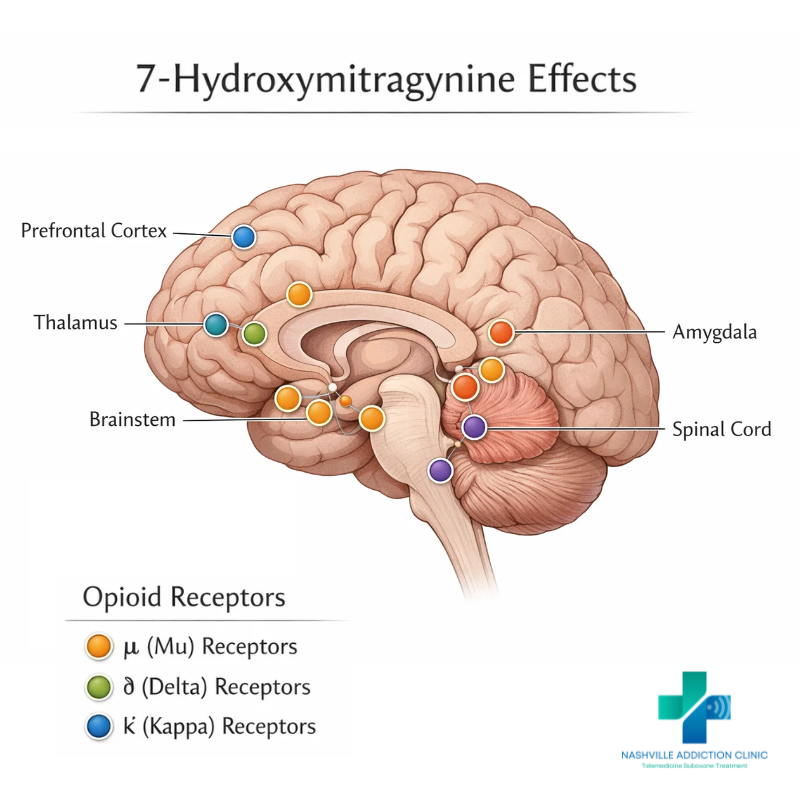Understanding the Kratom Withdrawal Timeline: What Tennessee Residents Need to Know

The kratom withdrawal timeline can feel overwhelming for anyone struggling with dependence. For people in Tennessee searching for answers, understanding what to expect and knowing that safe, virtual treatment is available can make all the difference. At Nashville Addiction Clinic, we’ve helped more than 1,000 patients across Tennessee—including in Murfreesboro, Clarksville, Chattanooga, Knoxville, and Memphis—find freedom from opioids and kratom through compassionate, evidence-based care.
What Is Kratom and Why Is Withdrawal So Difficult?
Kratom is a plant-based substance often marketed as “natural” or “safe,” but it acts on the same brain receptors as opioids. According to the FDA, kratom is not approved for any medical use and carries a high risk of addiction. Many people use it to self-manage pain, anxiety, or opioid withdrawal, but over time it can create dependence.
Just like prescription opioids or heroin, stopping kratom suddenly can lead to severe withdrawal symptoms, making it difficult to quit without help.
The Kratom Withdrawal Timeline
Every person’s experience with withdrawal is unique, but most patients report symptoms beginning within 12 to 24 hours after their last dose. Here’s a general kratom withdrawal timeline:
- First 24 Hours:
- Anxiety, irritability, muscle aches
- Cravings and difficulty sleeping
- Flu-like symptoms (runny nose, sweating)
- Anxiety, irritability, muscle aches
- Days 2–3 (Peak Symptoms):
- Nausea, diarrhea, abdominal pain
- Severe fatigue, depression, restlessness
- Cravings may feel overwhelming
- Nausea, diarrhea, abdominal pain
- Days 4–7:
- Physical symptoms begin to ease
- Emotional symptoms (depression, anxiety) may remain strong
- Sleep patterns may still be disrupted
- Physical symptoms begin to ease
- Weeks 2–4:
- Mood swings and fatigue may linger
- Cravings triggered by stress or environment
- Mood swings and fatigue may linger
- Beyond 1 Month:
- Post-acute withdrawal (PAWS) possible
- Emotional health support and medication-assisted treatment (MAT) often needed for long-term recovery
- Post-acute withdrawal (PAWS) possible
These symptoms can be frightening, but safe treatment options—especially Suboxone through telemedicine—can ease the process and prevent relapse.
Why Treatment Is Safer Than Quitting Alone
Untreated withdrawal often pushes people back to kratom, opioids, or even fentanyl. The DEA warns that contaminated kratom products have been linked to overdose and even death. Opioid addiction remains a leading cause of accidental death in the U.S., and Tennessee is no exception.
Trying to quit alone can be dangerous. With professional care, however, withdrawal can be controlled, cravings reduced, and recovery sustained.
Telemedicine Treatment with Nashville Addiction Clinic
At Nashville Addiction Clinic, we pioneered TeleMAT (telemedicine medication-assisted treatment)—becoming the first clinic in Tennessee licensed to treat opioid addiction 100% virtually.
Here’s what makes us different:
- Convenience: No need to drive to a clinic—appointments are done securely by phone or video.
- Accessibility: We accept TennCare Medicaid, commercial insurance, and self-pay options.
- Proven Success: Over 1,000 Tennesseans treated since our opening more than 6 years ago.
- Accredited & Trusted: Accredited by The Joint Commission, with over 100 five-star Google reviews (read reviews here).
- Expert Care: Every counselor holds a master’s degree, and our owners are in active recovery themselves.
📲 Call or text us today at (615) 927-7802 or send us a secure message on the Spruce Health app.
👉 Ready to start?
- Register with commercial insurance
- Register with TennCare Medicaid
- Register as self-pay
- Register as a returning patient
- Apply for our Sliding-Scale Program
Suboxone for Kratom Withdrawal Timeline
Suboxone is FDA-approved for treating opioid use disorder, and it can be life-changing for people going through kratom withdrawal. It:
- Reduces cravings
- Eases withdrawal symptoms
- Stabilizes brain chemistry
- Provides a safer, long-term recovery plan
For patients addicted to hydrocodone, morphine, oxycodone, fentanyl, methadone, or kratom, Suboxone can make the transition to sobriety nearly painless.
FAQs About the Kratom Withdrawal Timeline
How long does kratom withdrawal last?
Most physical symptoms improve within 7 days, but emotional and psychological symptoms may linger for weeks without treatment.
Can Suboxone help with kratom withdrawal?
Yes. Suboxone targets the same receptors as kratom, reducing withdrawal symptoms and cravings.
Is kratom safer than opioids?
No. The FDA and DEA both warn that kratom carries risks of addiction, contamination, and overdose.
Can I get treatment without visiting a clinic?
Absolutely. Nashville Addiction Clinic provides virtual Suboxone treatment through secure telemedicine, so you never have to leave your home.
Why Choose Nashville Addiction Clinic?
- First virtual addiction clinic licensed in Tennessee
- Over 6 years of trusted telemedicine treatment
- Serving men and women 18 to 65 years old across the state
- Owned by people in recovery, built on kindness and respect
- Affordable options: insurance and pricing & sliding-scale program
Related Articles
- Suboxone Treatment in Tennessee: A Virtual Path to Recovery
- Suboxone Online Doctors in Tennessee: A Safer Path to Recovery
- Suboxone Treatment Tennessee: A Virtual Lifeline for Opioid Recovery
- Start MAT Today: A New Beginning with Nashville Addiction Clinic














